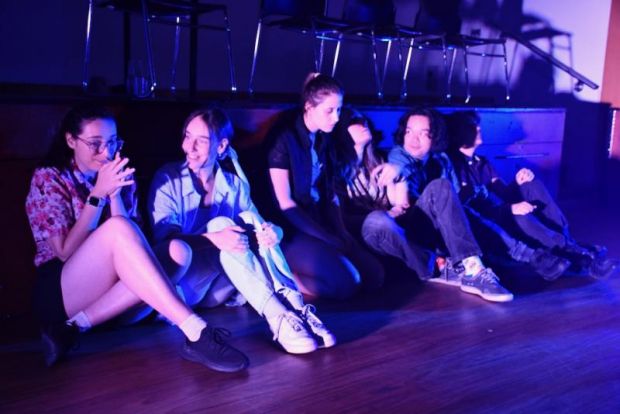Savages
Ten years after a school camp, six friends reunite to talk about what happened that one, terrible night. At first, conversation is superficial, but as the alcohol flows, the restrained rage of questions bursts from each of the six, who have dealt with tragedy in very different ways.
It’s a story of childhood innocence smashed by tragedy, which is slowly, slowly revealed to us. The six young adults talk over each other with ‘remember when?’ prompts to set the scene and progress the narrative – and this wordplay where the ending of one person’s sentence is taken up by another is where this production works best. It’s fast, initially disconnected, and the audience must work out how the pieces go together.
The performances are fine too – there are six distinct characters brought to life by good actors, clearly articulating their particular form of post-traumatic stress. Standout is Lauren Paolini’s Emma, whose haunting silent looks convey her inability to deal with the event much more convincingly than the loud overlapping rants of the others around her.

There is appropriately minimal set and lighting, but the cast have to work hard to get their words audible in the echoes of the venue. When they do leave the cold-white lit platform to restage the events of that night, they run and crawl up and down the aisles, trying to build the atmosphere and tension – but we still have no clues to the ultimate secret.
When we do get to the big reveal, its disembodied delivery introduces new information that hasn’t been signposted at all – the release of the tension induces a reaction of surprise, not shock or horror.
The play, written by Tom Robins, who also performs, doesn’t seem sure where to go from here – and it definitely doesn’t know how to end. It’s far too weighted to the over-exposition in the first hour and is inconsistent in how much it shows, how much it tells – or how much it holds back. The well-drawn characters alone are not enough to make this work. There is some originality in the story here, however well-worn this trope is, but the play needs pruning back for that to blossom.
Review by Mark Wickett
To check out our round-up of Adelaide Fringe reviews, click here.
Subscribe to our E-Newsletter, buy our latest print edition or find a Performing Arts book at Book Nook.
